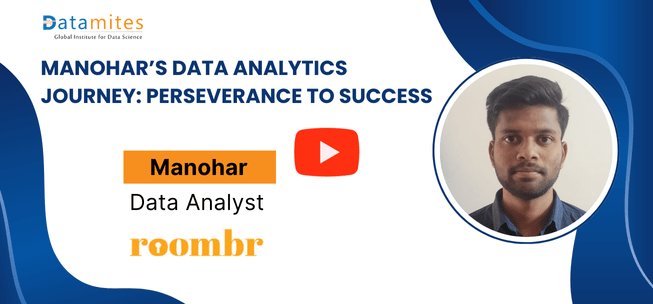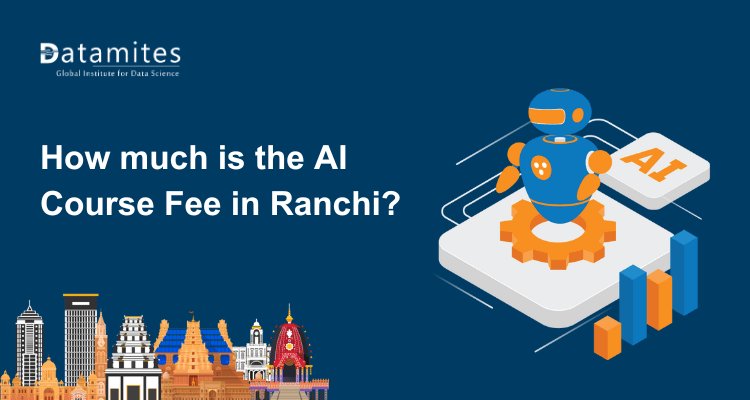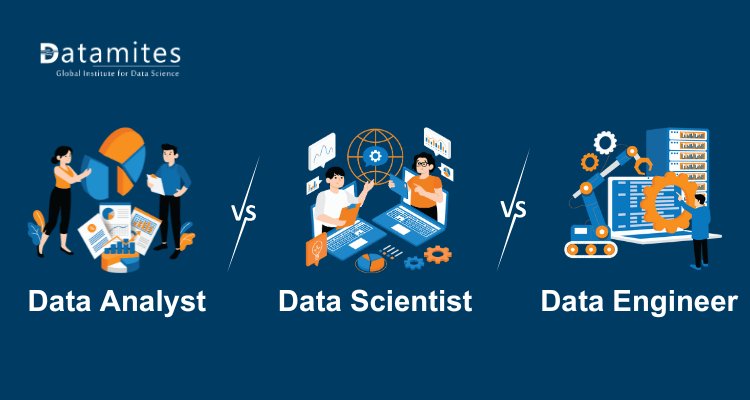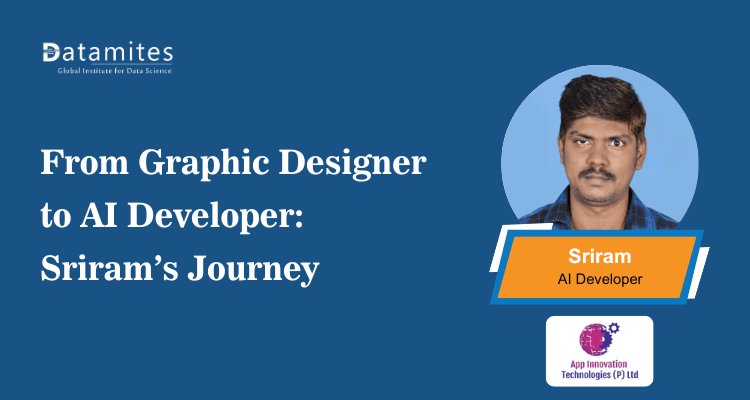Manohar’s Data Analytics Journey: Perseverance to Success
Discover Manohar’s inspiring journey to becoming a Data Analyst. Learn how he mastered Excel, SQL, and Power BI through DataMites training. Explore tips on Data Analyst skills, projects, interview prep, and career growth in India’s booming data analytics industry.
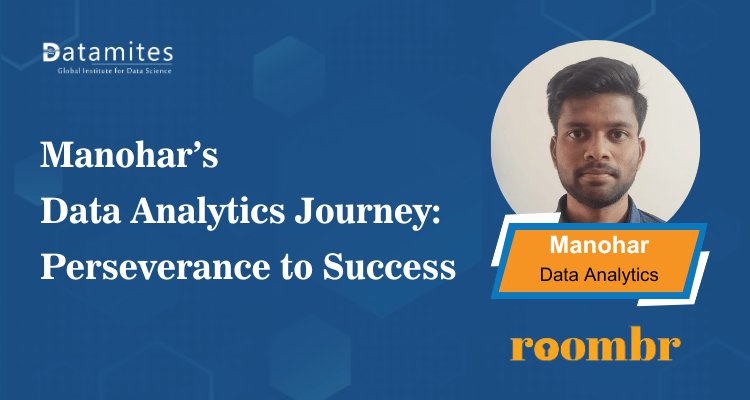
In the competitive world of data analytics, transitioning from a student to a working professional requires dedication, strategic learning, and hands-on experience. Manohar, a fresher from Vishakhapatnam, shares his journey of becoming a Data Analyst after completing a certified course at DataMites. Here’s an in-depth look at his experiences and strategies in a question-answer format.
Manohar’s Inspiring Transition to Data Analyst
Manohar transitioned to a data analyst career by upskilling through online courses and hands-on projects. His dedication to learning data analytics tools and real-world applications helped him secure a job in the field.
Q1: Can you introduce yourself and your background?
Manohar: My name is Manohar, and I am from Vishakhapatnam. I completed my graduation in Computer Science from KITE College. After graduation, I decided to pursue a career in data analytics and enrolled in a certified Data Analyst course at DataMites. During my internship, I worked on three projects, and currently, I am interning as a Data Analyst at Roombr Company.
Q2: Why did you choose DataMites for your learning journey?
Manohar: I researched the best institutes for Data Analytics and Data Science on Google. DataMites Institute ranked in the top search results, so I inquired about multiple institutes before deciding that DataMites was the right fit for me. Their structured curriculum and practical approach convinced me to join.
Q3: Why did you choose Data Analytics despite having a Computer Science background?
Manohar: While I have a CS background, I wasn’t very confident in coding. Compared to fields like Full Stack Development, Data Analytics requires relatively less coding. It is also a booming industry with high demand, making it an ideal choice for me.
Q4: What kind of questions were asked in your job interviews?
Manohar: My interviewers mainly focused on Power BI and Power Query Editor, including questions like:
- Difference between Power BI and Power BI Service
- How to clean data and remove values
- How to extract data from websites or online resources
- For SQL, I was asked to write queries, such as:
- Deleting values from a column without removing the column itself
- Difference between RANK and DENSE RANK
- How to find duplicate values
Q5: What tools are you currently using in your internship?
Manohar: Though the requirement was for Power BI, I am currently working with Excel. Excel is an advanced tool, and while Power BI is better for handling large datasets, Excel remains a fundamental tool for data analysis.
Q6: How important is SQL for a Data Analyst role?
Manohar: SQL is extremely important. Almost every job description lists SQL as a mandatory skill. While knowledge of Power BI, Tableau, or Python is beneficial, SQL is a necessity. Most of my interviews included SQL-based questions.
Q7: Which core tools and concepts should a Data Analyst focus on?
Manohar: The most important Data Analysts tools are:
- SQL (for querying and database management)
- Power BI and Tableau (for data visualization)
- Excel (for data manipulation and reporting)
- Python (Pandas Library) (for advanced data processing)
Read the articles:
- From Graduate to Data Analyst Success: Celciya’s Journey
- Kavana's Journey: From Learning to a Successful Data Analyst
- Subasree's Inspiring Journey: From Fresher to Data Analyst
Q8: Did your interviews include questions on Machine Learning?
Manohar: While I learned about Linear Regression and Logistic Regression during the course, I was not asked any machine learning-related questions in interviews. However, having an understanding of these concepts can be beneficial.
Q9: How did you prepare for your interviews?
Manohar: I followed a strict study schedule:
- Classroom learning: 12 PM - 2 PM
- Self-study: 4-5 hours daily, including YouTube tutorials and practice sessions
- SQL and Python practice: Using online resources and ChatGPT-generated questions
Q10: How did you structure your resume?
Manohar: DataMites provided sample ATS-friendly resumes. I selected a fresher-friendly template, listed my three projects, technical skills (SQL, Power BI, Python, Excel), and analytical skills. After submission, the placement team reviewed and finalized it.
Q11: How did DataMites support your placement?
Manohar: DataMites Institute offered excellent placement assistance. They provided multiple top Data Analyst job roles and helped with resume building, interview preparation, and skill assessment. The support helped me secure an internship.
Q12: How many projects did you work on, and do projects impact interviews?
Manohar: I worked on three projects:
- Customer Care Analysis
- Medical Data Analysis
- Automobile Insurance Company Rankings
These projects were crucial in interviews, as recruiters often asked about my project experience.
Q13: How did you practice SQL and Python?
A: I practiced using questions provided by DataMites, searched for additional queries on the internet, and used ChatGPT to generate practice questions based on specific topics.
Q14: How long did your DataMites journey last?
Manohar: It took me six months, from October to March, including coursework and projects. The structured curriculum and hands-on learning helped me build a strong foundation in Data Analytics.
Q15: Any final advice for aspiring Data Analysts?
Manohar:
- Practice SQL daily, as it is a must-have skill.
- Work on real-time projects to showcase in your resume.
- Use multiple resources like YouTube, ChatGPT, and online challenges to enhance your learning.
- Stay consistent and put in 4-5 hours of self-study daily.
Key findings from Manohar’s Data Analyst journey:
Manohar's inspiring transition into the world of data analytics reveals valuable lessons for every aspiring Data Analyst—from skill-building to strategic learning.
1. Structured Learning Played a Crucial Role
Manohar's decision to enroll at DataMites provided him with a clear and structured learning path. The institute’s well-designed curriculum and hands-on training helped him build a strong foundation in core analytics tools like SQL, Excel, and Power BI.
2. Practical Projects Enhanced His Interview Readiness
Completing three real-world projects during his internship gave Manohar valuable experience. These projects allowed him to confidently discuss his skills during interviews and showcase his ability to apply concepts in practical scenarios.
3. Focus on SQL and Excel is Essential
Throughout his preparation, Manohar emphasized the importance of mastering SQL and Excel. He highlighted that while tools may vary across companies, SQL is a constant requirement for almost every Data Analyst role.
4. Self-Study and Discipline Made a Difference
Manohar consistently dedicated 4–5 hours daily to self-study, in addition to attending live sessions. His routine involved watching YouTube tutorials, practicing problems, and revisiting classroom concepts, which significantly boosted his confidence and understanding.
5. Resume Building and Placement Support Were Valuable
With help from the DataMites team, Manohar created an ATS-friendly resume that highlighted his strengths and projects. The institute’s placement support provided him with numerous job opportunities, helping him secure a Data Analyst internship at Rombar Company.
Manohar's journey from a Computer Science graduate to a Data Analyst intern highlights the importance of structured learning, hands-on projects, and self-discipline. His experience at DataMites and his strategic approach to learning serve as a roadmap for aspiring Data Analysts.
Read the articles below:
- Data Analyst Course Fee in Hyderabad
- Data Analyst Course Fee in Bangalore
- Data Analyst Course Fee in Pune
With dedication and the right training, anyone can transition into the data analytics field and build a successful career. The "Instahyre Tech Salary Index 2025" reports that Bangalore accounts for 35% of India’s tech workforce, while Delhi-NCR and Hyderabad each hold 20%, followed by Pune at 15% and Chennai at 10%.
Joining offline data analyst courses in Bangalore, along with cities like Chennai, Hyderabad, Pune, Ahmedabad, Coimbatore, Delhi, Jaipur, and Mumbai, offers industry exposure, networking opportunities, and better job prospects, creating a strong foundation for careers in data analysis and software development.
At DataMites Institute, we are not just an educational hub; we are your launchpad to a successful career in Data Science, Analytics, and AI. Our mission is to provide the highest quality training that empowers individuals with industry-ready skills. Whether you're looking to break into the world of data science or elevate your expertise, DataMites offers comprehensive, hands-on learning experiences.
We offer a job-oriented curriculum that includes live training sessions, ensuring you gain practical experience while mastering core concepts. You can choose between online classes for flexibility or on-demand offline training, tailored to fit your learning preferences.
What sets DataMites apart is our commitment to mentorship from industry professionals and our focus on real-time projects and internships, which build your portfolio and job readiness. Our courses are certified by IABAC and NASSCOM FutureSkills, ensuring the credibility and global recognition of your qualifications.
DataMites Institute provides extensive offline Data Analyst courses in Chennai and various Indian cities, including Bangalore, Chennai, Pune, Ahmedabad, Jaipur, Coimbatore, Delhi, and Mumbai, catering to diverse learning needs.
With DataMites, you're not just learning—you're preparing to thrive in the competitive tech industry.
